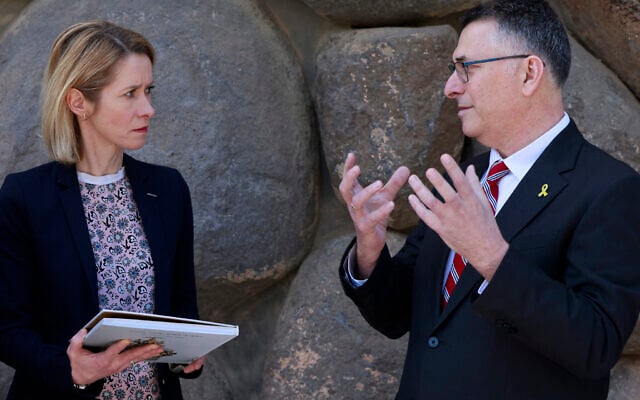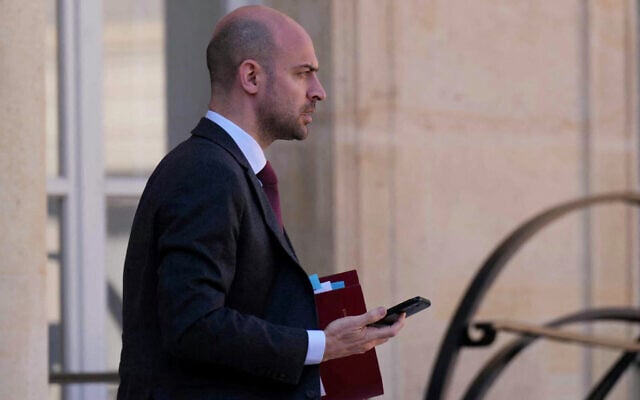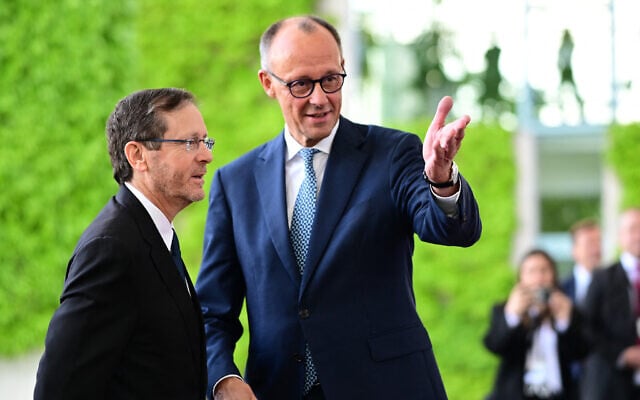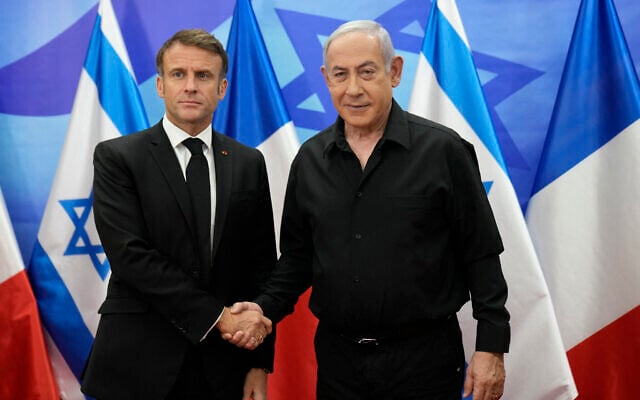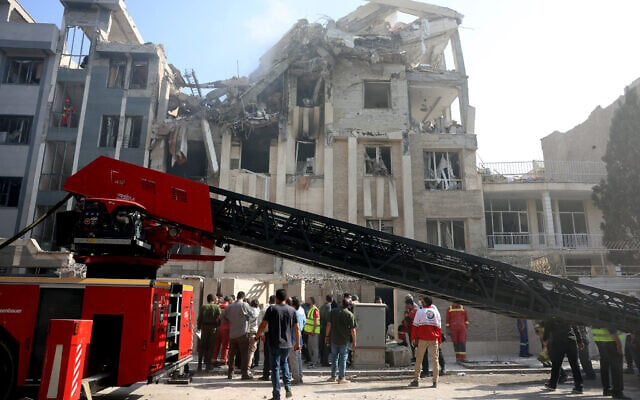


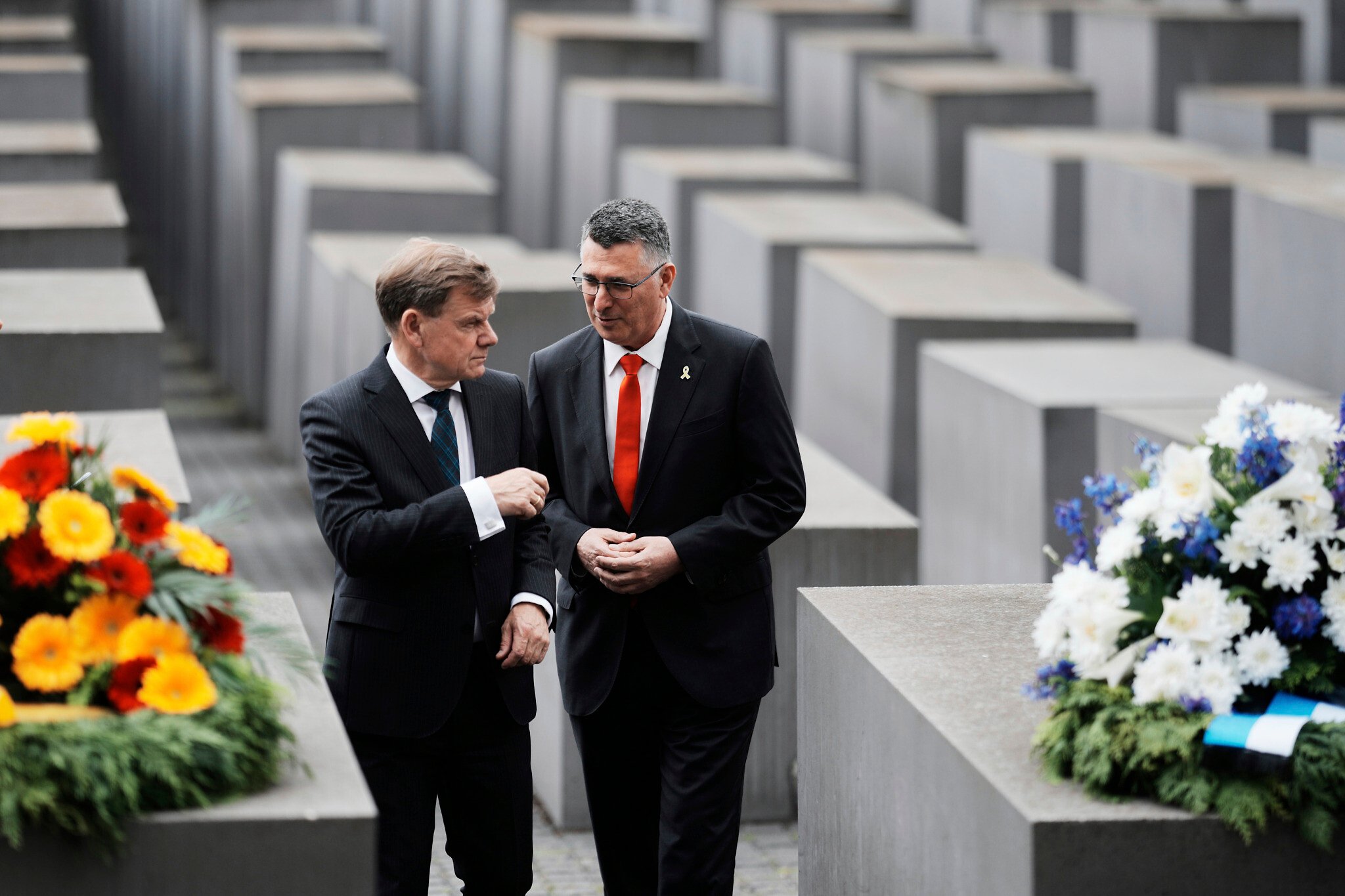
Foreign Minister Gideon Sa’ar spoke on Friday with a range of foreign diplomats about the Israeli strikes on nuclear and military targets in Iran that occurred in the early hours of the morning, as a number of foreign leaders expressed support for Israel’s actions, including from France and Germany.
“We made this decision at the last possible minute, after all other avenues had been exhausted,” Sa’ar told Germany’s Johann Wadephul, according to the FM’s office. “The whole world saw and understood that the Iranians were not ready to stop, and we had to stop them. The latest IAEA report illustrated the serious Iranian violations. We know that challenging days lie ahead, but we have no other choice.”
Sa’ar also spoke with Italian Foreign Minister Antonio Tajani, briefing him on the IDF operation. The pair also discussed the ongoing Gaza war, with Sa’ar telling him that “Israel is also interested in reaching a hostage deal, something Hamas has so far rejected.”
In a conversation with EU foreign policy chief Kaja Kallas, Sa’ar said the strikes were targeting both Iran’s nuclear program and its long-range missile project, saying Tehran is close to “becoming the number one missile manufacturer in the world,” and that this increases the threat of Iran’s “plan of elimination against Israel.”
He added that the Islamic Republic’s missile capabilities “also endanger Europe,” as he said he understood from conversations with European leaders.
Kallas herself wrote in a statement on X: “The situation in the Middle East is dangerous. I urge all parties to exercise restraint and prevent further escalation. Diplomacy remains the best path forward, and I stand ready to support any diplomatic efforts toward de-escalation.”
Sa’ar also spoke with his French counterpart, Jean-Noël Barrot, emphasizing that Israel’s military actions will continue with the goal of “removing the existential threats to Israel.”
Sa’ar also thanked Barrot for his statement earlier Friday before their call, in which he said that France has “repeatedly expressed our deep concerns regarding Iran’s nuclear program” and that it reaffirms “Israel’s right to defend itself against any attack.”
Barrot noted in his statement that Paris is closely monitoring the situation with its partners and that it calls “on all parties to act with restraint and to avoid any escalation that could undermine regional stability.”
He added that “the security of our citizens and the protection of our interests in the region are at the top of our priorities,“ concluding that “it is essential to activate all diplomatic channels to help de-escalate tensions. France is fully committed to contributing to this effort.”
Barrot said he also held talks with the Saudi foreign minister over Israel’s attack on Iran, and French President Emmanuel Macron convened his security council on Friday morning to discuss the security situation in the Middle East.
Meanwhile, German Chancellor Friedrich Merz said in a statement that Prime Minister Benjamin Netanyahu informed him about Israel’s attack on Iran in a phone call on Friday morning.
Merz said that Israel has a right to defend itself, but he also called on both sides to refrain from escalation. He added that Germany was coordinating closely with partners, particularly the United States, Britain and France.
There was no criticism of Israel in his statement.
Instead, Merz stressed Germany’s longstanding concern over Iran’s advanced nuclear weapons program, particularly following the IAEA resolution and Iran’s subsequent threats to further accelerate uranium enrichment. “This nuclear program violates the provisions of the Nuclear Non-Proliferation Treaty and poses a serious threat to the entire region, especially to the State of Israel.”
Merz added that Germany will increase security around Jewish and Israeli sites in the country.
According to the German outlet Spiegel, Netanyahu informed Merz of the attack shortly before it ensued, but the Chancellery did not respond to a request for comment by Reuters.
French President Emmanuel Macron, who has been harshly critical of Israel’s war in Gaza, said Israel had the right to protect itself and called for “maximum restraint” from all parties following Israel’s wave of strikes on Iran.
“France reaffirms Israel’s right to defend itself and ensure its security,” Macron said in English on X. “To avoid jeopardizing the stability of the entire region, I call on all parties to exercise maximum restraint and to de-escalate.”
Rafael Grossi, the head of the International Atomic Energy Agency, also called on all parties to exercise maximum restraint and to avoid further escalation.
In Russia, the Kremlin condemned and expressed concern over the “sharp escalation” between Israel and Iran, spokesman Dmitry Peskov told Russian state media.
The Russian embassy in Tel Aviv pressed Russians in Israel to leave the country if they could and said it “strongly recommends” against traveling there until the “situation normalizes.”
Moscow’s mission in Tehran issued a similar warning, saying it was advising citizens to “refrain from visiting Iran,” avoid going near military facilities, and not to take photos or videos anywhere in the country.
Czech Foreign Minister Jan Lipavsky struck a tone more supportive of Israel’s actions, saying the attack on Iran was a reasonable response given Tehran’s nuclear ambitions and support for groups seeking to destroy Israel.
The Czech Republic, an EU and NATO member of 10.9 million people, is a staunch supporter of Israel despite mounting criticism from Western allies over its actions in Gaza amid the war sparked by the Tehran-backed Hamas terror group’s October 7, 2023, onslaught.
Iran “is supporting so many players, including the Hezbollah and Hamas movements, with the intention to destroy the State of Israel, and also seeking a nuclear bomb,” Lipavsky told reporters in Prague, adding that he viewed the action as “reasonable.”
“I have a great deal of understanding for, let’s say, military action aimed at preventing the production of a nuclear bomb in the region,” he continued. “Iran has long failed to fulfill its obligations to the international community, is building up its nuclear program and, at the same time, uses rhetoric aimed at destroying the State of Israel.”
Israel’s attack on Iran early Friday morning targeted nuclear sites, military facilities, missile bases and Iranian senior leadership.
Multiple waves of Israeli strikes were reported throughout Iran for several hours, starting at around 3 a.m. and into the morning. Over 200 Israeli Air Force aircraft were involved in the opening strikes, and fighter jets dropped over 330 munitions on some 100 targets, the IDF said.

